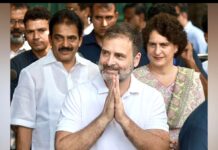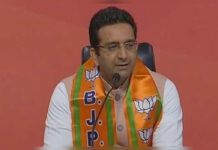New Delhi: In a bid to enhance voter privacy and prevent the misuse of election-related data, the Election Commission of India (ECI) amended the Conduct of Election Rules in December, Chief Election Commissioner (CEC) Rajiv Kumar announced on Tuesday. The amendment specifically targets the use of CCTV footage from polling booths, restricting public access to such recordings to ensure voter privacy and to prevent the footage from being exploited for machine learning purposes.
The rule change, which was notified by the Law Ministry at the recommendation of the ECI, restricts access to the CCTV footage from polling booths, which was previously available to the public. “Only CCTV camera footage from the booth will not be given. It was prohibited earlier also,” Kumar stated. This decision comes in light of concerns over the potential misuse of footage for profiling voters and training machine learning algorithms.
Kumar further clarified that the amended rule, Rule 93(2), still allows access to 25 election-related forms. “All of them were available and will continue to be available,” he said, reassuring the public that transparency would remain intact while safeguarding voters’ privacy.
The primary motivation behind the amendment, according to Kumar, is to protect the identity and privacy of voters. He elaborated on the large volume of CCTV footage generated during elections, noting that with over 10.5 lakh booths across the country, each generating 10 hours of footage per booth, the total amount of recorded footage could span approximately 1 crore hours—equivalent to 3,600 years of footage.
Kumar highlighted the risks of this footage being misused for machine learning, which could result in the creation of artificial intelligence-generated content that could be weaponized to influence elections and spread disinformation on social media. “Why do they want to watch it? I will tell you why. It will be given for machine learning. All our faces, all our privacy, will be in the public domain. How we vote, the machine will learn it,” Kumar said.
He also warned about the potential legal consequences if the footage were to be misused. “If we give the footage of even one constituency, that means about 1,800-1,900 constituencies. If someone tries to get that, it will take them 6.5 years to watch it. The tenure would have ended, and the limit for filing an election petition would have also lapsed. These footages are misused, and we could take criminal action, but we stop ourselves,” Kumar explained.








“Thanks for sharing such valuable information!”
get clomid without insurance cost of generic clomiphene without a prescription get generic clomid for sale can i purchase cheap clomiphene prices cost of cheap clomiphene online how to buy cheap clomid without prescription get clomid pills
This is a theme which is in to my fundamentals… Myriad thanks! Exactly where can I lay one’s hands on the connection details an eye to questions?
More posts like this would bring about the blogosphere more useful.
buy cheap generic zithromax – zithromax 500mg for sale buy metronidazole no prescription
rybelsus 14mg uk – buy periactin generic cost periactin
Ramatogel adalah tempat membawa keberuntungan terbesar di Indonesia dan menyediakan persentase tertinggi mari gabung sekarang di ramatogel dapatkan bonus fantastis setiap hari
order domperidone online cheap – buy sumycin 250mg generic order flexeril 15mg without prescription
augmentin 1000mg price – https://atbioinfo.com/ where can i buy acillin
buy esomeprazole 20mg – https://anexamate.com/ order esomeprazole 20mg online
purchase meloxicam online cheap – https://moboxsin.com/ order meloxicam 7.5mg without prescription
order prednisone 5mg pill – aprep lson prednisone drug
buy erectile dysfunction medicine – buy ed pills canada herbal ed pills
purchase amoxicillin pills – buy amoxicillin online cheap buy amoxicillin generic
cheap diflucan – click diflucan 200mg drug
cenforce brand – click order cenforce 100mg
what does cialis treat – https://ciltadgn.com/# buying generic cialis online safe
order ranitidine generic – aranitidine cheap ranitidine
buy viagra online australia – https://strongvpls.com/ best place to buy viagra yahoo
The thoroughness in this section is noteworthy. prednisolona niГ±os
Thanks towards putting this up. It’s understandably done. accutane 10 mg
More articles like this would frame the blogosphere richer. https://ursxdol.com/synthroid-available-online/
The sagacity in this serving is exceptional. prednisolone 20 mg prix
Thanks on putting this up. It’s evidently done. https://ondactone.com/simvastatin/
Thanks recompense sharing. It’s acme quality.
order sumycin
More articles like this would pretence of the blogosphere richer. http://iawbs.com/home.php?mod=space&uid=914824
order forxiga 10mg without prescription – https://janozin.com/ buy forxiga 10 mg
order xenical generic – https://asacostat.com/ order generic orlistat 60mg
You can shelter yourself and your dearest close being heedful when buying medicine online. Some pharmacy websites operate legally and offer convenience, secretiveness, cost savings and safeguards as a replacement for purchasing medicines. buy in TerbinaPharmacy https://terbinafines.com/product/arimidex.html arimidex
This website really has all of the information and facts I needed there this case and didn’t identify who to ask. cialis super active en belgique
I’ll certainly bring to be familiar with more.
kuwin sở hữu kho game đa dạng từ slot đến trò chơi bài đổi thưởng, mang đến cho bạn những giây phút giải trí tuyệt vời.
Khám phá thế giới giải trí trực tuyến đỉnh cao tại MM88, nơi mang đến những trải nghiệm cá cược thể thao và casino sống động.
采用高效谷歌站群策略,快速提升网站在搜索引擎中的可见性与权重。谷歌站群
Tham gia cộng đồng game thủ tại Go88 để trải nghiệm các trò chơi bài, poker phổ biến nhất hiện nay.
Some really prize blog posts on this website , saved to favorites.
Spin into pure joy with Sweet Bonanza — where wins pay in any position and cascades keep coming! Unlock how to play sweet bonanza free spins packed with 10x–100x bombs. Sweet success awaits!
Thunderous thrills in every triumphant turn. free buffalo slots delivers herds of hits, scatters, and progressive power. Win big!
chumba casino redeem cash brings Vegas vibes straight to your phone. Claim free Sweeps Coins on signup and chase real cash redemptions. Fun never felt this rewarding!